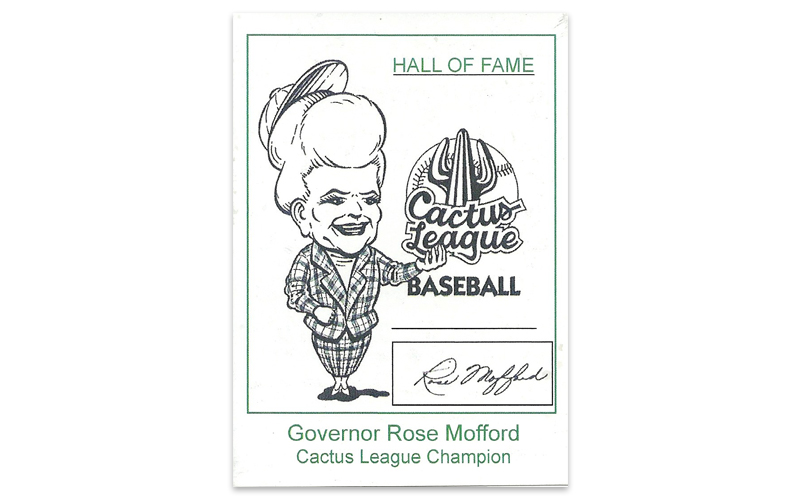
A baseball card featuring former Arizona governor Rose Mofford was created for her induction into the Cactus League Hall of Fame in 2014. (Image courtesy Geoffrey Gonsher)
PHOENIX – Near the end of spring training in 1990, MLB Commissioner Fay Vincent came to Arizona Gov. Rose Mofford with an ultimatum, according to former Maricopa County Board of Supervisors Chairman Jim Bruner.
“Major League Baseball loves Arizona, but the Cactus League facilities are not very good,” Bruner said Vincent told Mofford. “If we didn’t do something to clean up the mess, the teams would look at other options.”
The Cactus League stood in danger of folding then. But a quarter-century later, it is still around and stronger than ever, thanks in large part to Mofford, who died Thursday at 94.
Mofford had begun the effort to save the Cactus League in 1988, her first year as governor. Eight teams came to the Arizona desert every year to prepare for the MLB season, but three – the San Diego Padres, Seattle Mariners and Cleveland Indians – were considering leaving Arizona for the Grapefruit League in Florida.
Stephanie McBride-Schreiner, who wrote “And So To Go On With My Story: Rose Mofford, First Lady of Arizona,” said Mofford issued an executive order that began the process that would bring the Cactus League back from the verge of extinction.
“It was through Executive Order No. 88-3 that she pushed through that actually saved the Cactus League,” McBride-Schreiner said. “She was under a spotlight at this time. She stepped in and issued the executive order that established a task force to study what was going on and what was needed to keep the Cactus League here.”
The group’s idea included the creation of a car-rental surcharge that would go toward building better facilities for the franchises if they chose to remain in Arizona. Bruner said a $2.50 surcharge per rental car was enacted and raised approximately $200 million for the development of new Cactus League stadiums.
The plan paid off. Not only did the teams stay in Arizona, but the Cactus League ultimately expanded from eight teams to 15, all playing in the Valley.
Of the 10 ballparks currently being used by the 15 MLB franchises, nine were constructed after Mofford’s term in office. Tempe Diablo Stadium was opened in 1969. But Scottsdale Stadium opened in 1992, one year after Mofford left office. It was followed by Peoria Sports Complex (1994), Hohokam Stadium (1997), Maryvale Baseball Park (1998), Surprise Stadium (2003), Goodyear Ballpark (2009), Camelback Ranch (2009), Salt River Fields at Talking Stick (2011) and Sloan Park (2014).
Geoffrey Gonsher, a former special assistant to the governor who worked closely with Mofford, said she realized the value of keeping the Cactus League alive.
“She recognized the economic value of spring training. At that time it was about $150 million a year, which really meant $150 million a month,” Gonsher said. “She also recognized the recreational value to our residents. Historically, families have gone on a regular basis. It was enjoyment for the people of Arizona.”
The expansion of the league has continued to help Arizona’s economy each spring.
According to the most recent economic impact survey of the Cactus League, published in 2015, “the teams and the ballparks they play in annually generate more than $809 million in economic impact for the state.”
Mofford didn’t just maintain the Cactus League, she also put Arizona in the mix to land a Major League Baseball team, according to Gonsher.
“Her vision was far-reaching. It was not just saving Cactus League baseball, but bringing a Major League team to Arizona in the future. She was visionary in that respect,” he said. “She saw the future. She saw that the investment today would pay off later on, and it did. We have the Arizona Diamondbacks.”
Mofford was inducted into the Cactus League Hall of Fame as part of its inaugural class in 2014.